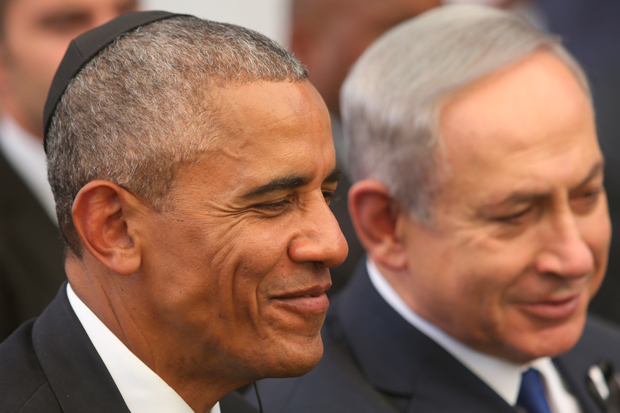Stabbing an ally in the back
After so injudiciously ratifying the Paris climate agreement on the very day Donald Trump won the election, the Turnbull government may have redeemed themselves in the eyes of the new administration.
This was in an Abbott-style declaration that if Australia were still on the Security Council, we would have opposed the Christmas-Hanukah Resolution condemning Israel’s West Bank settlements, including those in East Jerusalem, as if Judaism’s holiest places had never existed. If only Kevin Rudd had delayed wasting billions on buying that Security Council seat, we could at least have been in splendid and principled isolation against the usual dictators and elites.
Following this declaration, the government should consider moving our embassy to Jerusalem, whose liberation in 1917 followed the glorious victory at Beersheba of the Australian Light Horse under Sir Harry Chauvel.
Almost every US administration, including Obama’s when he wanted to be re-elected, has used its veto in favour of Israel. Now a lame duck, Obama has apparently reverted to the teachings of his onetime spiritual advisor, the Rev. Jeremiah Wright, whose anti-Semitic and anti-white diatribes for years enriched Obama’s Sundays at Chicago’s Trinity United Church. In not only failing to exercise the veto but even coordinating the vote, Obama has treacherously betrayed a close ally. Given Britain’s historic role in Palestine, Theresa May’s government’s action in pushing the matter can only be described as perfidious, while that of Bill English’s New Zealand government is at least unwise.
Ineffectual legally, the vote will still be a political weapon for anti-Semites. If this were limited to those who boycott chocolate shops, infringe what remains of free speech in our universities and have local councils pass pointless copycat resolutions, it could be tolerated. But worse may follow, including violence or even yet another intifada. If anyone doubts that, just recall what followed Israeli PM Ehud Barak’s extraordinarily generous offer of a two-state solution at Camp David.
Hundreds of times larger than Israel, almost all of the 22 Arab states have at some time indicated, with some acting on it, a wish to destroy Israel. Less than one third the size of Tasmania, yet absorbing large numbers of persecuted Jewish refugees from the Arab world without dooming them to permanent refugee status, she offers her Arab citizens what none enjoy in any Arab state − the vote in truly democratic elections with a full array of human rights. Israel has become one of the world’s most technologically advanced nations, not so surprising when you consider that with 0.2 per cent of the world’s population, Jews have been awarded 26 per cent of all Nobel Prizes in the sciences. Her neighbours should be taking advantage of the economic cooperation which Israel could offer rather than endlessly brooding over destroying what is an ornament in the region.
It was the Romans who renamed the Jewish homeland ‘Palestine’, a word derived from ‘Philistine’. Under the control of a succession of empires, Palestine was finally wrested from the Turkish Ottomans by the British in the First World War, with, as Tony Abbott has reminded us, Australian troops playing a significant role. Put under a League of Nations mandate or trust in 1922, with Britain appointed the mandatory power, this gave effect to Britain’s 1917 Balfour Declaration proposing a national home in Palestine for the Jewish people, without prejudicing the civil and religious rights of existing non-Jewish communities. The fulfilment of this undertaking was confirmed by the victorious principal allied powers and by resolutions of the US Congress.
The Mandate covered present-day Israel, Gaza, the West Bank and Jordan. But in part fulfilment of their promise to reward the Hashemites for fighting with Lawrence of Arabia against the Turks, the British put Prince Abdullah on what would become the Jordanian throne. Jordan was then, with League approval, extracted from the promise to create a Jewish homeland which was thus reduced to a mere 23 per cent of Palestine.
Because of an almost uncontrollable intifada in the thirties, the British began to restrict Jewish immigration, contrary to the Mandate, but proved soft on the more difficult-to-identify Arab immigration which was not envisaged under the Mandate. Unfortunately, all this coincided with the rise of Nazism and Fascism. After the Second World War, Britain relinquished her role as mandatory power with Israel declaring her independence. She was then attacked by the neighbouring Arab states, with Egypt occupying Gaza and Jordan the West Bank. After other hostilities, they unwisely attacked again in the 1967 Six Day War. As a result , both territories were lost to a victorious Israel.
Under article 80 of the UN Charter, these territories clearly remain legally subject today to the Jewish right of settlement established in the Mandate. The article was carefully drafted with precisely this in mind; no mere Security Council resolution can ever change this.
The opponents of Israel argue that the Fourth Geneva Convention introduced in response to Nazi atrocities in occupied territories outlaws Israel’s settlements. This is patently untrue; the convention only applies when the territory of a state party to the Convention is occupied which is clearly not the case with the West Bank. In accordance with the Mandate this remains part of the Jewish homeland. Israel alone can forfeit this, as she has to a great extent in Gaza.
The continual calls for a two-state solution, which would involve creating a tiny second Palestinian state smaller than Brisbane, have proved to be a smoke screen and have surely run their course. On the seven occasions when Israel or the Jewish community have agreed to these, her opponents have either backed away or imposed ridiculous conditions.
Their agenda remains. In the words of the Tehran mullahs, it is that agenda, unacceptable to the civilised world, of ‘Death to Israel’.
Got something to add? Join the discussion and comment below.
Get 10 issues for just $10
Subscribe to The Spectator Australia today for the next 10 magazine issues, plus full online access, for just $10.
You might disagree with half of it, but you’ll enjoy reading all of it. Try your first month for free, then just $2 a week for the remainder of your first year.














Comments
Don't miss out
Join the conversation with other Spectator Australia readers. Subscribe to leave a comment.
SUBSCRIBEAlready a subscriber? Log in